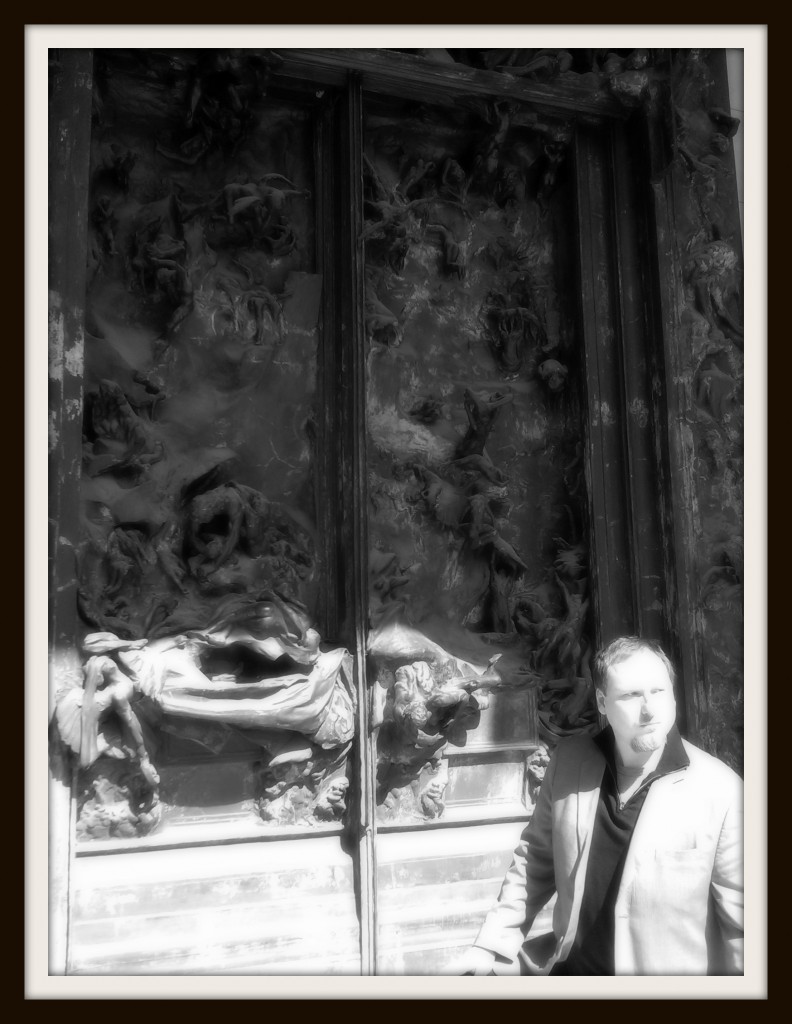Bury me with a book open on my chest,
As if I’d just fallen asleep reading it.
Bury me on the couch where I napped.
Aim my muddy feet to the west
So I may see one more smoldering sunset.
Leave the grave soil loose, so I won’t feel trapped.
In the spring, I want to hear bird and toad.
Bring my tabby, the one with toffee streaks,
When you visit, so he can hear them too.
Death collects a debt you forgot you owed,
And he does his job for both strong and weak.
He runs out the clock and then comes for you.
After the funeral, remember, for a bit,
How we were young once, and joked about it.
Read on at Praxilla.

Ernest Hilbert before Auguste Rodin’s Gates of Hell (La Porte de l’Enfer).
From the forthcoming collection All of You on the Good Earth (2013).
Publisher’s announcement:
Ernest Hilbert’s newest collection, All of You on the Good Earth, continues to explore the bizarre worlds of 21st-century America first glimpsed in his debut, Sixty Sonnets, which X.J. Kennedy hailed as “maybe the most arresting sequence we have had since John Berryman checked out of America” and “whose dark harmonies and omnivorous intellect remind the reader of Robert Lowell’s,” according to Adam Kirsch. Critics have called Hilbert’s poems “at once ironic, dark, and witty,” containing the “full range of human types and stories, and nearly the whole breadth of what the sonnet can do,” “showy and spectacular,” “both seriously tough-minded and wryly self-chiding,” concluding that “the only other poet who plies risk against reward so deftly is Pound.” Poet and critic David Yezzi salutes Hilbert as “a twenty-first-century beatnik in Elizabethan ruff.”
At the end of the tumultuous year 1968, Apollo 8’s Commander Frank Borman described the earth-rise as sending “a torrent of nostalgia, of sheer homesickness, surging through me.” He signed off: “Good night, good luck, a Merry Christmas, and God bless all of you—all of you on the good Earth.” All of You on the Good Earth guides the reader through chambers occupied by visionary gravediggers, spaced-out movie stars and pugnacious comic book characters come to life, frenzied dropouts, sullen pirates, and unrelenting stalkers, noble war correspondents and cornered dictators, unlucky drunks and supercilious scientists, impatient goddesses and sad sea monsters, zoned-out denizens of Plutonian strip-clubs and earnest haunters of ancient ruins, the infamous Rakewell in TriBeCa and sea nymph Kalypso in a beach house at the Jersey shore, characters wandering an America demoralized by economic decline. These poems contain fasts and feasts, laments and love songs, histories, fantasies, and elegies, the amusing and heartbreaking debris of life on this world, all the while recalling Seneca’s dictum, non est ad astra mollis e terris via (“the road from the earth to the stars is not easy”).
Hilbert has written poems of superb lyricism. It’s hard to think of another poet with such range, and indeed with such brilliant delivery. Beauty, trash, exaltation, and humor are contained in his capacious and exacting forms. These are, quite simply, original and essential poems.” – Justin Quinn, author of American Errancy: Empire, Sublimity, and Modern Poetry


3 Comments
Love your poetry.
Mike Poteet writes in: I liked “Simple Instructions,” especially the image of being buried with a book open on the chest. This, too, seems very much in line with Ecclesiastes (not to mention John Donne’s “for whom the bell tolls” sermon) thematically, and is a strong reminder to appreciate and enjoy life while we can.
Bill writes in: I really enjoyed this poem of yours, Ernie. While I haven’t died yet, I could see myself in it, and who can resist anything resembling a mirror? Even Quasimodo would hesitate and glance in passing one. In 14 lines you painted a life and a death which is no small task. I took your hint to go to Praxilla and found your others. I very much enjoyed the poem “of empires” too. Nice work.